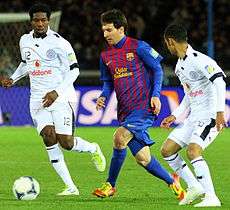Al Sadd SC
Al-Sadd Sports Club (Arabic: نادي السد الرياضي) is a Qatari sports club based in the Al Sadd district of the city of Doha. It is best known for its association football team, which competes in the top level of Qatari football, the Qatar Stars League. Locally, it is known primarily by the nickname "Al Zaeem", which translates to "The Boss". It is known as the best team in Qatar and is the only Qatari team that has won the AFC Champions League in Asia. In addition to football, the club has teams for handball, basketball, volleyball, table tennis and athletics.[1] It is the most successful sports club in the country, and holds a national record of 57 official football championships.[2]
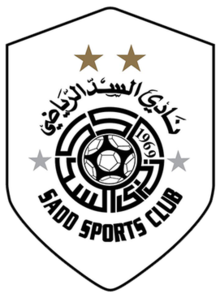 | |||
| Full name | Al Sadd Sports Club | ||
|---|---|---|---|
| Nickname(s) | Al Zaeem (The Boss) Al Dheeb (The Wolf) Al Aalami (The World Class) Malik Al Qulub (King of Hearts) | ||
| Founded | 21 October 1969 | ||
| Ground | Jassim Bin Hamad Stadium | ||
| Capacity | 12,946 | ||
| Chairman | Mohammed bin Khalifa Al Thani | ||
| Manager | Xavi Hernández | ||
| League | Qatar Stars League | ||
| 2018–19 | Qatar Stars League, 1st (champions) | ||
| Website | Club website | ||
|
| |||
| Al Sadd's active sections | ||
|---|---|---|
Football |
Basketball |
Handball |
Volleyball |
Futsal |
Athletics |
The origin of Al Sadd's conception began with four Qatari students who excelled in football, but did not wish to join any of the existing football clubs. After consulting with the minister of Youth and Sports, the group, led by Abdulla bin Ahmed bin Mubarak Al Ali and Ali bin Mohammad bin Ali bin Sultan Al Ali, founded the club on 21 October 1969 in Qatar's capital city.
In the 1989 season, they became the first Arab club side to triumph in the Asian Club Championship by defeating Al Rasheed of Iraq on an aggregate of away goals. Twenty-two years later, they won the 2011 Asian Champions League and earned a spot in the 2011 FIFA Club World Cup, in which Al Sadd finished third. They also earned a spot in the 2019 FIFA Club World Cup automatically as host club, in which Al Sadd finished sixth.
History
1969–1980: Foundation and beginnings
Al Sadd was established by eleven high school students who excelled in playing football, with the oldest member being 17 years old. They refused to join other clubs at the time and decided to make their own club. Four of them consulted with Sheikh Qassim bin Hamad Al-Thani, who was the minister of Youth and Sports at the time. He obliged their request, resulting in the formation of Al Sadd Sports Club. Many of the early players and supporters were remnants of Al Ahrar SC, a club which was dissolved in the 1966/67 season. In their initial year of establishment, the father of one of the founders, Hamad bin Mubarak Al Attiyah, coached the club and the team trained on a football pitch in a local high school.[3]

The club won the first ever league title in 1971–72. However, this was one year before the league was officially recognized. Thus, they won their first official QSL title in 1973–74. Sadd, along with Al Arabi and Al Rayyan, went on to dominate Qatari football in the 70s and the 80s by winning many Qatari League trophies and Emir Cups. Youssef Saad, a Sudanese forward who played for the club since its inception, was the first ever professional player to officially join the ranks of Al Sadd.[4] In 1974, while Al Sadd was still in its infancy, they dubiously transferred 14 players, including Mubarak Anber and Hassan Mattar, and head coach Hassan Othman from Al Esteqlal (later to be known as Qatar SC), much to the dismay of club président Hamad bin Suhaim. Transfers could be made unconditionally during this time, meaning Esteqlal's protests were in vain. This was a major factor in them winning their first cup championship the next year in 1975. They defeated Al Ahli 4–3 in a tightly contested match under the leadership of Hassan Osman in order to claim the Emir Cup. Their goals came from Youssef Saad, who scored a brace, and Ali Bahzad and Abdullah Zaini. Till this day, it is the joint-largest score in an Emir Cup final match.[5]
They won the first ever Sheikh Jassim Cup held in 1977–78, as well as winning it two more times in the next two years. In 1978–79, the club succeeded in achieving their first domestic double by winning both, the Sheikh Jassim Cup and the league, accomplishing the same feat the next season.
1980–2000: First international success
In the 1981–82, they won the Emir Cup and Sheikh Jassim Cup, once again under the reigns of Hassan Osman. During this period, Badr Bilal and Hassan Mattar, both of whom were top scorers in the league at one point, led the team to victories in both of the finals. Al Sadd also succeeded in setting an Emir Cup record by defeating Al Shamal 16–2, the largest recorded win in the history of the tournament. They nearly completed a domestic triple in 1987, but lost 2–0 to Al Ahli in the Emir Cup final that year.[5]
They were the first team to play against English side Cheadle Town on their home grounds, Park Road Stadium, under the leadership of Jimmy Meadows in 1982. They were victorious by a 4–1 margin.[6]
Al Sadd won their Champions League debut in 1988 (then known as Asian Club Championship), where they secured the top position in their group. They faced Al-Rasheed of Iraq in the final, defeating them on away goals, thus fending the Iraqis off in order to claim the title of the first Arab team to ever win the championship. The victorious team was largely made up locals, with the exception of Lebanese Wassef Soufi and Iranian Amir Ghalenoii, who did not participate in the final due to the Iran–Iraq War.[7] In addition to winning the Asian Champions League, they won the Sheikh Jassim Cup and the league on that year. They were the first team to play in Iran after the Iran–Iraq War, losing 1–0 to Esteghlal in an ACC match in 1991.[7] The 1990s were a lean phase for Al Sadd, regarding the league. They could not win even one league championship during that period. However, they did manage to open their account in the Heir Apparent Trophy and also won the Gulf Club Champions Cup in 1991.
2000–2010: New century, new possibilities
The new millennium opened up a new era for Al Sadd. They returned to winning ways in the Qatari League, won many Emir Cups and Heir Apparent trophies. They also managed a triple crown in regional football by winning the Arab Champions League in 2001.

They recorded the largest-ever win in the Sheikh Jassim Cup in 2006, when they defeated Muaither 21–0.
In 2007, under the command of Uruguayan coach Jorge Fossati, they achieved a quadruple by winning all four domestic cups. They were the first Qatari team to do so, and had also set a league record for the highest winning streak by winning 10 leagues games in a row.[8] In addition, they made a record signing in Qatari football by paying $22 million for the Argentinian Mauro Zárate the same year. In 2010, they were the second team to ever win the QNB Cup by defeating Umm Salal in the final.
2010–2012: Second Fossatti era
Al Sadd was placed in the qualifying play-offs of the 2011 Champions League, courtesy of the disqualification of Vietnamese teams due to the non-submission of documents. They beat Al-Ittihad of Syria and Indian club, Dempo SC, 5–1[9] and 2–0 respectively, to acquire a spot in the group stage. Al Sadd, who were the definite underdogs, overcame the odds and topped their group to play against Al-Shabab, whom they beat 1–0.
The quarter-final against Sepahan would mark the first sign of controversy for the club. Sepahan had initially won the first-leg match against Al Sadd 1–0; however, after the match, Al Sadd lodged a formal complaint to the AFC as Sepahan had fielded an ineligible player, Rahman Ahmadi, who previously received two yellow cards in the tournament with his former club. The match was overturned 3–0 in favor of Al Sadd, virtually ensuring the club a place in the semi-finals.[10]
They later faced Suwon Samsung Bluewings in a highly publicized semi-final. Suwon were favorites to win after knocking last year's runners-up, Zob Ahan, out of the running. The first-leg match was played in Suwon, South Korea. In the 70th minute of the match, Mamadou Niang of Al Sadd had a deflected shot veer past the goalkeeper, settling the score 1–0. Ten minutes later, a Suwon player was inadvertently kicked in the head by an Al Sadd defender, prompting Suwon to kick the ball out of play. While the injured Suwon player was being tended to, Niang sprinted past the keeper to score a second goal, infuriating the Suwon players. The chaos was elevated when a Suwon fan had run onto the pitch, sparking a mass melee which involved both coaching staff and players. After the fight was brought to a halt, the referee sent off a player from each team while Niang later got a red card and Al Sadd's Korean defender Lee Jung-soo had walked off the pitch in frustration.[11]
The melee prompted official investigation from the AFC, who suspended three players from both teams for six games.[12] Al Sadd lost the second leg 1–0, though this allowed them to advance to the final with a 2–1 aggregate to face Jeonbuk Hyundai Motors. Al Sadd later received the nickname "Al-Badd" from the Korean media as a result of their semi-final confrontations.[13]
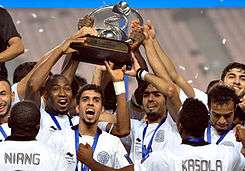
They won the 2011 AFC Champions League Final against Jeonbuk, 4–2 on penalties.[14][15] This earned them a spot in the 2011 FIFA Club World Cup.
To date, this is the best result achieved by a Qatari team in the AFC Champions League under its new format. Al Sadd also became the first team to reach the AFC Champions League knockout stage after starting their campaign in the play-offs in February.[16] Furthermore, Al Sadd was crowned "AFC Club of the Year" in 2011 by AFC after their Champions League conquest. Championship 2011 in honor of the club's owner changed the team logo and stars to commemorate the AFC Champions League 1988.2011 was etched on the shirt Wolves.[17]
During the 2011 FIFA Club World Cup, Al Sadd were eliminated in the semi-final stage by Barcelona, which set up a third-place meeting between them and Kashiwa Reysol. This was the first time two clubs from the same confederation faced off each other in a third-place match. Al Sadd won the encounter on penalties in order to be the first West Asian club to claim the bronze medal in the FIFA Club World Cup.[18]
2012–present: Post-ACL champions

After the departure of Fossati, former Al-Sadd midfielder Hussein Amotta was named as the new coach in May 2012. The Moroccan had finished as the Qatar League top scorer during his four-year stay at the club from 1997 to 2001. He was working as the club's technical director prior to being promoted to the top job.[19]
Just days before Amouta's appointment, Al-Sadd announced the high-profile signing of former Real Madrid captain Raúl, who arrived on a free transfer from Schalke 04.[20]
Managed by Amouta and led by new captain Raúl, Al Sadd set a league record for the best start to the league season ever by winning all of their first nine games, shattering the previous record set by Al Gharafa, who had won seven.[8] The team went on to break Lekhwiya's two-year dominance by winning the 2012–13 Qatar Stars League title, five years after their last triumph in the competition.[21]
Al-Sadd faltered in the next two seasons, however, finishing third and second in 2013–14 and 2014–15 respectively, as Lekhwiya returned to win back-to-back titles once again. In 2015, Al-Sadd achieved the coup of signing Barcelona's storied Spanish international Xavi.[22]
With Qatar as host of the 2019 FIFA Club World Cup when announced by the FIFA Council on 3 June 2019, Al Sadd SC automatically qualified as the host club team.
Stadium and facilities
Home matches are played in the state-of-the-art (football-specific) Jassim Bin Hamad Stadium (also known as Al Sadd Stadium), with a capacity which adds up to 18,000, including VIP stands.[23] The stadium, originally built in 1974, was renovated in 2004 for the Gulf Cup. Situated near central Doha, the venue attracts large numbers of spectators. It is the de facto home stadium of the Qatar national football team.[24]
Jassim Bin Hamad is a very distinct stadium in the Middle East because of its unique features, such as the cooling system which is implemented.[25]
.jpg)
| Stadium | Period |
|---|---|
| Tariq bin Zayed Stadium[3] | 1969–1975 |
| Jassim Bin Hamad Stadium | 1975–present |
Colours and crest
Among Al Sadd's most popular nicknames are Al Zaeem (The Boss) and Al Dheeb (The Wolf). From the foundation of the club, the common home kit includes a white shirt, black or white shorts, and white socks. White and black colours are also seen in the crest. The away kit of the club is associated with a black background. Pink was adopted as the club's primary colour for their third uniform in 2007.[26]
Their first crest was designed in Lebanon in 1969, and was similar to other football clubs in the region, in the sense that it depicted a football with Arabic writing on it.[27] This crest was an hommage to former football club Al Ahrar. Originally, the club wanted to use the same crest as Al Ahrar, but this idea was rejected by the QFA.[3] A second crest was designed in the eighties, and was designed by the founder of the club, Nasser bin Mubarak Al-Ali. It was used until 1999, the year in which their third crest was designed, also by Nasser bin Mubarak Al-Ali, in celebration of the 30-year anniversary of the founding of the club. Following their impressive AFC Champions League campaign in 2011, the logo was modified and released in June 2012 to include two golden stars on the top to mark the two Asian titles of 1989 and 2011.[27]
Shirt sponsors and manufacturers
| Period | Kit manufacture | Shirt sponsor(s) |
|---|---|---|
| ?–2016 | Vodafone | |
| 2017–present | Qatar Airways | |
International club winnings
| Country | Club | From | Ref |
|---|---|---|---|
| Al Hilal | 2010 | [28] | |
| Zamalek | 2012 | [29] | |
| Al Hilal | 2014 | [30] | |
| Schalke 04 | 2015 | [31] | |
| Trabzonspor | 2017 | [32] |
Youth development
The club hosts numerous âge brackets with a number of youth coaches. Many notable local footballers have graduated from Al Sadd's academy, including Jafal Al Kuwari, Khalid Salman, Hassan Al Haidos and former Asian player of the year, Khalfan Ibrahim. There have been foreign graduates as well, such as UAE's Mutaz Abdulla. They have a youth development programme, which instills philosophies and enforces training ideals among the youth players.[33] The programme had 284 participants enrolled as of 2011.[34]
Seasons overview
Season-to-season
| Season | Championship | Qatar Emir Cup | Crown Prince Cup | Sheikh Jassim Cup | Continental Comp. | |||||||||||
|---|---|---|---|---|---|---|---|---|---|---|---|---|---|---|---|---|
| Div. | Pos. | Pts | P | W | D | L | F | A | GD | Goalscorer | ||||||
| Al-Sadd Sports Club (ASSC) | ||||||||||||||||
| 1973–74 | D1 | Champion | - | - | - | - | - | - | - | - | - | Runners-up | NC | NC | - | - |
| 1974–75 | D1 | - | - | - | - | - | - | - | - | - | - | Winner | NC | NC | - | - |
| 1975–76 | D1 | - | - | - | - | - | - | - | - | - | - | – | NC | NC | - | - |
| 1976–77 | D1 | - | - | - | - | - | - | - | - | - | - | Winner | NC | Winner | - | - |
| 1977–78 | D1 | - | - | - | - | - | - | - | - | - | - | – | NC | Winner | - | - |
| 1978–79 | D1 | Champion | - | - | - | - | - | - | - | - | – | NC | Winner | - | - | |
| 1979–80 | D1 | Champion | - | - | - | - | - | - | - | - | - | – | NC | - | - | - |
| 1980–81 | D1 | Champion | - | - | - | - | - | - | - | - | – | NC | Winner | - | - | |
| 1981–82 | D1 | - | - | - | - | - | - | - | - | - | - | Winner | NC | - | - | - |
| 1982–83 | D1 | - | - | - | - | - | - | - | - | - | - | Runners-up | NC | - | - | - |
| 1983–84 | D1 | - | - | - | - | - | - | - | - | - | - | – | NC | - | - | - |
| 1984–85 | D1 | - | - | - | - | - | - | - | - | - | - | Winner | NC | Winner | - | - |
| 1985–86 | D1 | - | - | - | - | - | - | - | - | - | - | Winner | NC | Winner | - | - |
| 1986–87 | D1 | Champion | - | - | - | - | - | - | - | - | - | Runners-up | NC | - | - | - |
| 1987–88 | D1 | Champion | - | - | - | - | - | - | - | - | Winner | NC | Winner | - | - | |
| 1988–89 | D1 | Champion | - | - | - | - | - | - | - | - | - | – | NC | - | Asian Club Championship | Winner |
| 1989–90 | D1 | - | - | - | - | - | - | - | - | - | - | – | NC | Winner | Asian Club Championship | QS |
| 1990–91 | D1 | - | - | - | - | - | - | - | - | - | - | Winner | NC | - | Asian Club Championship | QS |
| 1991–92 | D1 | Third | - | - | - | - | - | - | - | - | - | – | NC | - | Cup Winners' Cup | FR |
| 1992–93 | D1 | - | - | - | - | - | - | - | - | - | - | Runners-up | NC | NC | - | - |
| 1993–94 | D1 | - | - | - | - | - | - | - | - | - | - | Winner | NC | - | - | - |
| 1994–95 | D1 | - | - | - | - | - | - | - | - | - | - | – | Did not qualify | - | Cup Winners' Cup | QF |
| 1995–96 | D1 | 4th | 34 | 16 | 9 | 7 | 0 | 24 | 9 | +15 | - | – | Semi-final | - | - | - |
| 1996–97 | D1 | 5th | 27 | 16 | 7 | 6 | 3 | 19 | 9 | +10 | – | Semi-final | - | - | - | |
| 1997–98 | D1 | Third | 26 | 16 | 7 | 5 | 4 | 25 | 13 | +12 | – | Winner | Winner | - | - | |
| 1998–99 | D1 | Third | 33 | 16 | 10 | 3 | 3 | 29 | 15 | +14 | - | Quarter-finals | Semi-final | - | - | - |
| 1999–00 | D1 | Champion | 38 | 16 | 12 | 2 | 2 | 36 | 8 | +28 | - | Winner | Semi-final | Winner | Asian Club Championship | SR |
| 2000–01 | D1 | 6th | 24 | 16 | 7 | 3 | 6 | 25 | 21 | +4 | - | Winner | Did not qualify | - | Cup Winners' Cup | SR |
| 2001–02 | D1 | 4th | 25 | 16 | 7 | 4 | 5 | 31 | 30 | +1 | - | Runners-up | Semi-final | Winner | Cup Winners' Cup | 3rd place |
| 2002–03 | D1 | Runner-up | 31 | 18 | 9 | 4 | 5 | 30 | 14 | +16 | - | Winner | Winner | Group stage | Champions League | GS |
| 2003–04 | D1 | Champion | 42 | 18 | 13 | 3 | 2 | 38 | 10 | +28 | Semi-final | Runners-up | Group stage | Champions League | GS | |
| 2004–05 | QSL | 7th | 34 | 27 | 9 | 7 | 1 | 35 | 35 | 0 | Winner | Did not qualify | Group stage | Champions League | QF | |
| 2005–06 | QSL | Champion | 52 | 27 | 16 | 4 | 7 | 48 | 32 | +16 | Semi-final | Winner | Semi-final | Champions League | GS | |
| 2006–07 | QSL | Champion | 55 | 27 | 17 | 4 | 6 | 52 | 29 | +23 | Winner | Winner | Winner | Champions League | GS | |
| 2007–08 | QSL | Runner-up | 53 | 27 | 16 | 5 | 6 | 54 | 38 | +16 | Semi-final | Winner | Semi-final | Champions League | GS | |
| 2008–09 | QSL | Runner-up | 52 | 27 | 15 | 9 | 3 | 60 | 25 | +35 | Semi-final | Semi-final | Semi-final | - | - | |
| 2009–10 | QSL | Runner-up | 50 | 22 | 15 | 5 | 2 | 55 | 22 | +33 | Semi-final | Semi-final | Semi-final | Champions League | GS | |
| 2010–11 | QSL | 6th | 36 | 22 | 11 | 3 | 8 | 32 | 26 | +6 | Quarter-finals | Did not qualify | Semi-final | Champions League | Winner | |
| 2011–12 | QSL | 4th | 36 | 22 | 10 | 6 | 6 | 35 | 24 | +11 | Runners-up | Runners-up | Group stage | - | - | |
| 2012–13 | QSL | Champion | 51 | 22 | 16 | 3 | 3 | 47 | 23 | +24 | Runners-up | Runners-up | Runners-up | - | - | |
| 2013–14 | QSL | Third | 47 | 26 | 13 | 8 | 5 | 54 | 30 | +24 | Winner | Semi-final | Group stage | Champions League | QF | |
| 2014–15 | QSL | Runner-up | 57 | 26 | 17 | 6 | 3 | 68 | 35 | +33 | Winner | Semi-final | Winner | - | - | |
| 2015–16 | QSL | Third | 47 | 26 | 13 | 8 | 5 | 54 | 38 | +16 | Runners-up | Semi-final | Runners-up | - | - | |
| 2016–17 | QSL | Runner-up | 61 | 26 | 18 | 7 | 1 | 77 | 23 | +54 | Winner | Winner | - | Champions League | PR | |
| 2017–18 | QSL | Runner-up | 49 | 22 | 16 | 1 | 5 | 68 | 25 | +43 | Semi-final | Runners-up | Winner | Champions League | SF | |
| 2018–19 | QSL | Champion | 57 | 22 | 18 | 3 | 1 | 100 | 22 | +78 | Runner-up | - | - | Champions League | Round of 16 | |
- Note 1: The first official Qatari League season was held in 1972–73.
- Note 2: Competition was not held that year.
| Winner or champion | |
| Runner-up or second | |
| Semi-finalist or third | |
| Promotion on top division | |
| Relegation on lower division |
- Legend
Pts = points; P = play; W = wins; D = draws; L = losses; F = goals for; A = goals against; GD = goal difference; n.c. : not known
Performance in domestic competitions
- As of 26 April 2013.
Domestic cup finals No. Season Opposition Result Scorer(s) Head coach Emir Cup[5] 1 1974 Qatar SC 1–2 Youssef Saad 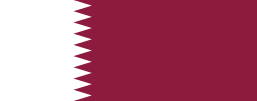
2 1975 Al Ahli 4–3 Youssef Saad (2), Ali Behzad, Abdulla Zaini 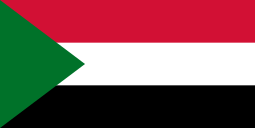
3 1977 Al Rayyan 1–0 Ali Behzad 
4 1982 Al Rayyan 2–1 Badr Bilal, Hassan Mattar 
5 1983 Al Arabi 0–1 N/A 
6 1985 Al Ahli 2–1 Hassan Jowhar, Khalid Salman 
7 1986 Al Arabi 2–0 Khalifa Khamis, Hassan Jowhar 
8 1987 Al Ahli 0–2 N/A 
9 1988 Al Wakrah 0–0 (4–3 pen.) Yousef Adsani, Ebrahim Ghasempour, Salah Salman, Mohammed Al Ammari 
10 1991 Al Rayyan 1–0 Ali Abdel Razak 
11 1993 Al Arabi 0–3 N/A 
12 1994 Al Arabi 3–2 Isaac Debra (2), Khalid Al Merreikhi 
13 2000 Al Rayyan 2–0 Diène Faye, Ezzat Jadoua 
14 2001 Qatar SC 3–2 Ahmed Khalifa, Radhi Shenaishil, Ali Benarbia 
15 2002 Al Gharafa 1–4 Jafal Rashed 
16 2003 Al Ahli 2–1 Mohammed Gholam (2) 
17 2005 Al Wakrah 0–0 (5–4 pen.) N/A 
18 2007 Al Khor 0–0 (5–4 pen.) N/A 
19 2012 Al Gharafa 0–0 (3–4 pen.) N/A 
Crown Prince Cup[35] 1 1998 Al Arabi 3–2 Sérgio (2), Hussein Amotta 
2 2003 Al Gharafa 2–0 Zamel Al Kuwari, Mohammed Gholam 
3 2004 Qatar SC 1–2 Medhat Mostafa (o.g.) 
4 2006 Qatar SC 2–1 Carlos Tenorio, Emerson Sheik 
5 2007 Al Gharafa 2–1 Carlos Tenorio (2) 
6 2008 Al Gharafa 1–0 Carlos Tenorio 
7 2012 Al Rayyan 1–1 (4–5 pen.) Khalfan Ibrahim 
8 2013 Lekhwiya 2–3 Younis Mahmoud, Lee Jung-Soo 
Current squad
First team squad
- See also: 2018–19 Al Sadd SC season
As of 20 May 2019.[36]
Reserve U23 | |||||||||||||||||||||||||||||||||||||||||||||||||||||||||||||||||||||||||||||||||||||||||||||||||||||||||||||||||||||||||||||||||||||||||||||||||||||||||||||||||||||||||||||||||||||||||||||||||||||||||||||||||||||||||||||||||||||||||||||||||||||||||||||||||||||||||||||||||||||||||||||||||||||||||||||||||||||||||||||||||||||||||||||||||||||||||||||||||||||||||||||||||||||||||||||||||||||||||||||||||||||||||||||||||||||||||||||||||||||||||||||||||||||||||||||||||||||||||||||||||||||||||||||||||||||||||||||||||||||||||||||||||||||||||||||||||||||||||||||||||||||||||||||||||||||||||||||||||||||||||||||||||||||||||||||||||||||||||||||||||||||||||||||||||||||||||||||||||||||||||||||||||||||||||||||||||||||||||||||||||||||||||||||||||||||||||||||||||||||||||||||||||||||||||||||||||||||||||||||||||||||||||||||||||||||||||||||||||||||||||||||||||||||||||||||||||||||||||||||||||||||||||||||||||||||||||||||||||||||||||||||||||||||||||||||||||||||||||||||||||||||||||||||||||||||||||||||||||||||||
Other players under contract
| |||||||||||||||||||||||||||||||||||||||||||||||||||||||||||||||||||||||||||||||||||||||||||||||||||||||||||||||||||||||||||||||||||||||||||||||||||||||||||||||||||||||||||||||||||||||||||||||||||||||||||||||||||||||||||||||||||||||||||||||||||||||||||||||||||||||||||||||||||||||||||||||||||||||||||||||||||||||||||||||||||||||||||||||||||||||||||||||||||||||||||||||||||||||||||||||||||||||||||||||||||||||||||||||||||||||||||||||||||||||||||||||||||||||||||||||||||||||||||||||||||||||||||||||||||||||||||||||||||||||||||||||||||||||||||||||||||||||||||||||||||||||||||||||||||||||||||||||||||||||||||||||||||||||||||||||||||||||||||||||||||||||||||||||||||||||||||||||||||||||||||||||||||||||||||||||||||||||||||||||||||||||||||||||||||||||||||||||||||||||||||||||||||||||||||||||||||||||||||||||||||||||||||||||||||||||||||||||||||||||||||||||||||||||||||||||||||||||||||||||||||||||||||||||||||||||||||||||||||||||||||||||||||||||||||||||||||||||||||||||||||||||||||||||||||||||||||||||||||||||
.jpg)

